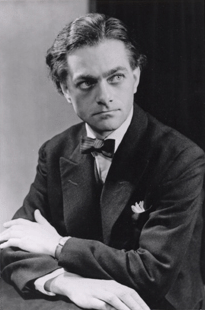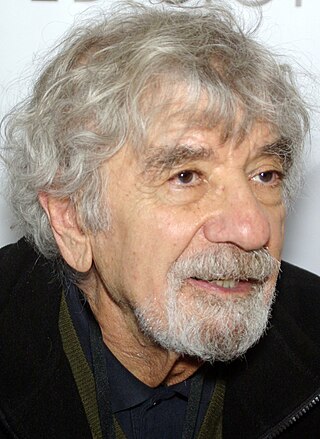Systems theory is the transdisciplinary study of systems, i.e. cohesive groups of interrelated, interdependent components that can be natural or artificial. Every system has causal boundaries, is influenced by its context, defined by its structure, function and role, and expressed through its relations with other systems. A system is "more than the sum of its parts" when it expresses synergy or emergent behavior.
Warren Sturgis McCulloch was an American Neuropsychologist and cybernetician known for his work on the foundation for certain brain theories and his contribution to the cybernetics movement. Along with Walter Pitts, McCulloch created computational models based on mathematical algorithms called threshold logic which split the inquiry into two distinct approaches, one approach focused on biological processes in the brain and the other focused on the application of neural networks to artificial intelligence.

Heinz von Foerster was an Austrian-American scientist combining physics and philosophy, and widely attributed as the originator of second-order cybernetics. He was twice a Guggenheim fellow and also was a fellow of the American Association for the Advancement of Science, 1980. He is well known for his 1960 Doomsday equation formula published in Science predicting future population growth.

William Ross Ashby was an English psychiatrist and a pioneer in cybernetics, the study of the science of communications and automatic control systems in both machines and living things. His first name was not used: he was known as Ross Ashby.
Second-order cybernetics, also known as the cybernetics of cybernetics, is the recursive application of cybernetics to itself and the reflexive practice of cybernetics according to such a critique. It is cybernetics where "the role of the observer is appreciated and acknowledged rather than disguised, as had become traditional in western science". Second-order cybernetics was developed between the late 1960s and mid 1970s by Heinz von Foerster and others, with key inspiration coming from Margaret Mead. Foerster referred to it as "the control of control and the communication of communication" and differentiated first-order cybernetics as "the cybernetics of observed systems" and second-order cybernetics as "the cybernetics of observing systems".

Andrew Gordon Speedie Pask was a British cybernetician, inventor and polymath who made multiple contributions to cybernetics, educational psychology, educational technology, applied episteomology, chemical computing, architecture, and systems art. During his life, he gained three doctorate degrees. He was an avid writer, with more than two hundred and fifty publications which included a variety of journal articles, books, periodicals, patents, and technical reports. He worked as an academic and researcher for a variety of educational settings, research institutes, and private stakeholders including but not limited to the University of Illinois, Concordia University, the Open University, Brunel University and the Architectural Association School of Architecture. He is known for the development of conversation theory.
The Macy conferences were a set of meetings of scholars from various academic disciplines held in New York under the direction of Frank Fremont-Smith at the Josiah Macy Jr. Foundation starting in 1941 and ending in 1960. The explicit aim of the conferences was to promote meaningful communication across scientific disciplines, and restore unity to science. There were different sets of conferences designed to cover specific topics, for a total of 160 conferences over the 19 years this program was active; the phrase "Macy conference" does not apply only to those on cybernetics, although it is sometimes used that way informally by those familiar only with that set of events. Disciplinary isolation within medicine was viewed as particularly problematic by the Macy Foundation, and given that their mandate was to aid medical research, they decided to do something about it. Thus other topics covered in different sets of conferences included: aging, adrenal cortex, biological antioxidants, blood clotting, blood pressure, connective tissues, infancy and childhood, liver injury, metabolic interrelations, nerve impulse, problems of consciousness, and renal function.

Louis Hirsch Kauffman is an American mathematician, mathematical physicist, and professor of mathematics in the Department of Mathematics, Statistics, and Computer Science at the University of Illinois at Chicago. He does research in topology, knot theory, topological quantum field theory, quantum information theory, and diagrammatic and categorical mathematics. He is best known for the introduction and development of the bracket polynomial and the Kauffman polynomial.
Ranulph Glanville was an Anglo-Irish cybernetician and design theorist. He was a founding vice-president of the International Academy for Systems and Cybernetic Sciences (2006–2009) and president of the American Society for Cybernetics (2009–2014).

Humberto Maturana Romesín was a Chilean biologist and philosopher. Many consider him a member of a group of second-order cybernetics theoreticians such as Heinz von Foerster, Gordon Pask, Herbert Brün and Ernst von Glasersfeld, but in fact he was a biologist, scientist.

Management cybernetics is concerned with the application of cybernetics to management and organizations. "Management cybernetics" was first introduced by Stafford Beer in the late 1950s and introduces the various mechanisms of self-regulation applied by and to organizational settings, as seen through a cybernetics perspective. Beer developed the theory through a combination of practical applications and a series of influential books. The practical applications involved steel production, publishing and operations research in a large variety of different industries. Some consider that the full flowering of management cybernetics is represented in Beer's books. However, learning continues.
A cybernetician or a cyberneticist is a person who applies cybernetics.

Stuart Anspach Umpleby is an American cybernetician and professor in the Department of Management and Director of the Research Program in Social and Organizational Learning in the School of Business at the George Washington University.
Frank Fremont-Smith was an American administrator, executive with the Josiah Macy, Jr. Foundation, president of British General Rees's World Federation of Mental Health, known together with Lawrence K. Frank as motivators of the Macy conferences, and as promoter for interdisciplinary conferences as platforms for advancing knowledge.
Constructivist Foundations is an international triannual peer-reviewed academic journal that focuses on constructivist approaches to science and philosophy, including radical constructivism, enactive cognitive science, second-order cybernetics, biology of cognition and the theory of autopoietic systems, and non-dualizing philosophy. It was established in 2005 and the editor-in-chief is Alexander Riegler.

Allenna Leonard is an American cybernetician, consultant and director of Team Syntegrity International, specializing in the application of Stafford Beer's Viable System Model and Syntegration. She was president of the American Society for Cybernetics (ASC) from 2002 to 2004 and president of the International Society for the Systems Sciences in 2009–2010, and led the organization of its 54th annual meeting in Waterloo, Canada. Leonard is president of Metaphorum since 2022.

Cybernetics is the transdisciplinary study of circular processes such as feedback systems where outputs are also inputs. It is concerned with general principles that are relevant across multiple contexts, including in ecological, technological, biological, cognitive and social systems and also in practical activities such as designing, learning, and managing.
Laurence Dale Richards has been a key figure in the modern development of cybernetics as a transdisciplinary field of inquiry, often referred to as the new cybernetics. He was the first to create interdisciplinary masters and doctoral programs in engineering management, with curricula built explicitly on concepts drawn from systems theory and cybernetics. He served as president for both the American Society for Cybernetics (1986–88) and the American Society for Engineering Management (1998–99) and was elected an Academician in the International Academy for Systems and Cybernetic Sciences in 2010.
Lars Löfgren was a Swedish cybernetician. He was awarded the Wiener Gold Medal by the American Society for Cybernetics in 2008.









